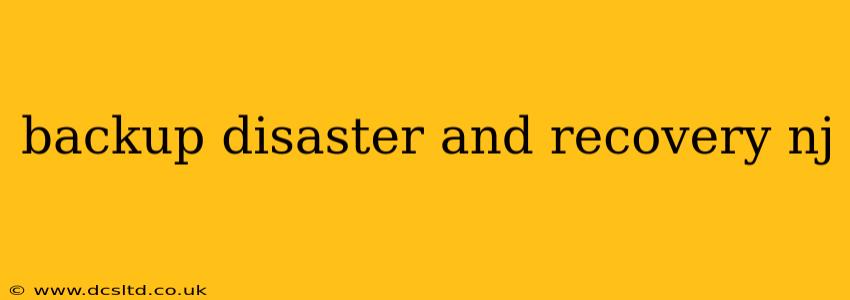Businesses in New Jersey face unique challenges when it comes to backup, disaster recovery (DR), and business continuity planning (BCP). From severe weather events like hurricanes and blizzards to the ever-present threat of cyberattacks, ensuring business resilience is paramount. This comprehensive guide explores the critical aspects of backup, DR, and BCP for New Jersey businesses, addressing common questions and offering practical advice.
What is Backup, Disaster Recovery, and Business Continuity Planning?
Before diving into New Jersey-specific considerations, let's clarify the terminology:
-
Backup: This refers to the process of creating copies of your critical data and systems. Regular backups are the foundation of any effective DR plan. They allow you to restore data and systems in the event of data loss or system failure. Types of backups include full, incremental, and differential backups, each with its own advantages and disadvantages.
-
Disaster Recovery (DR): This encompasses the strategies and procedures for restoring business operations after a disruptive event. A DR plan outlines steps to recover IT infrastructure, data, and business processes. This includes identifying critical systems, establishing recovery time objectives (RTOs), and recovery point objectives (RPOs).
-
Business Continuity Planning (BCP): This goes beyond IT recovery. BCP addresses the broader aspects of keeping your business operational during and after a disruption. This includes strategies for communication, employee safety, supply chain management, and customer relations. A comprehensive BCP integrates DR as a key component.
What are the Common Disaster Scenarios in NJ?
New Jersey's geographic location and infrastructure expose businesses to a range of potential disasters:
- Severe Weather: Hurricanes, blizzards, floods, and severe thunderstorms can cause widespread power outages, infrastructure damage, and business interruptions.
- Cyberattacks: Ransomware, phishing, and other cyber threats pose a significant risk to data security and business operations.
- Power Outages: Extended power outages can cripple businesses reliant on electricity.
- Infrastructure Failures: Damage to roads, bridges, and communication networks can disrupt business operations.
What are the Key Components of a NJ Disaster Recovery Plan?
A robust DR plan for a New Jersey business should include:
- Risk Assessment: Identify potential threats and vulnerabilities specific to your business and location.
- Data Backup and Recovery Strategy: Implement a comprehensive backup strategy that includes offsite storage to protect against local disasters. Consider cloud-based solutions for redundancy and accessibility.
- Recovery Time Objectives (RTOs) and Recovery Point Objectives (RPOs): Define acceptable downtime and data loss.
- Recovery Site: Determine a suitable location for recovering operations, such as a hot site, warm site, or cold site. This could be geographically diverse to protect against regional disasters.
- Testing and Maintenance: Regularly test your DR plan to ensure its effectiveness and identify any weaknesses.
What are the Regulations and Compliance Requirements for Data Backup in NJ?
New Jersey has various regulations concerning data privacy and security. Compliance with laws like the New Jersey Consumer Fraud Act and HIPAA (if applicable) influences your data backup and DR strategy. A strong DR plan contributes to compliance by ensuring data protection and business continuity in the event of a breach or disaster.
How much does Disaster Recovery cost in NJ?
The cost of disaster recovery in New Jersey varies greatly depending on factors such as the size and complexity of your business, the criticality of your data, your RTO and RPO requirements, and the chosen recovery solution (on-site, cloud-based, etc.). Consulting with a qualified IT professional is crucial to determine the optimal solution and associated costs for your specific needs.
How do I choose a Disaster Recovery Provider in NJ?
When selecting a DR provider in New Jersey, consider these factors:
- Experience: Look for a provider with a proven track record of successful DR implementations.
- Expertise: Choose a provider with expertise in handling the specific types of disasters relevant to New Jersey.
- Technology: Ensure the provider utilizes cutting-edge technology that meets your RTO and RPO requirements.
- Customer Support: Look for a provider that offers responsive and reliable customer support.
This guide provides a foundation for understanding backup, disaster recovery, and business continuity planning in New Jersey. Remember, a proactive approach is crucial to minimize disruption and ensure business resilience. It is highly recommended to consult with a qualified IT professional or disaster recovery specialist to develop a customized plan that meets your specific business needs and complies with all relevant regulations.
